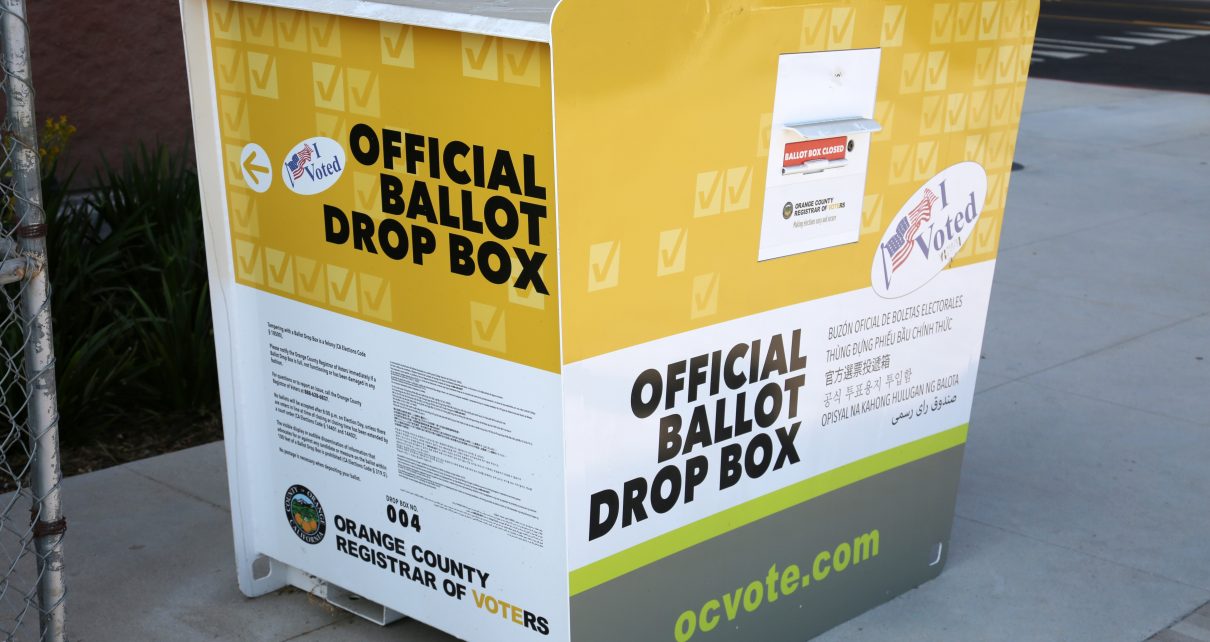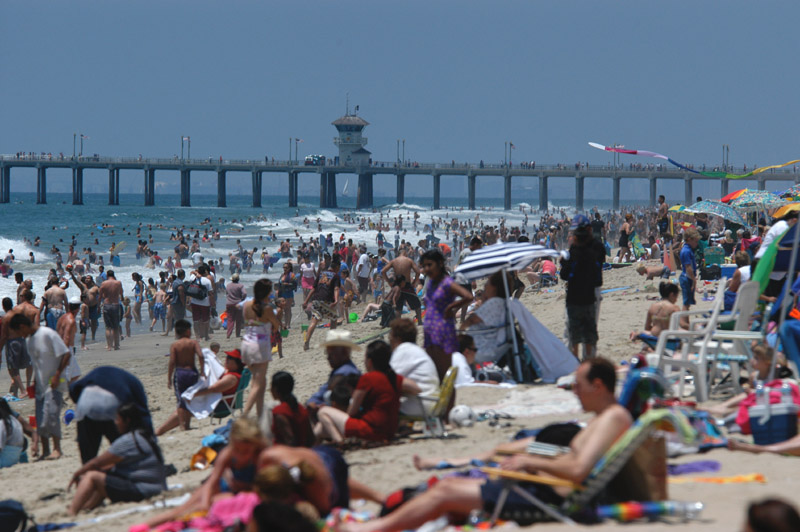
Official Ballot Drop Box placed ready to accept Voting Ballots for the upcoming election. Santa Ana, CA, Sept. 23, 2020. (Photo: mikeledray/Shutterstock)
Huntington Beach Sparks California Voter ID Debate
If the people of Mexico can have a voter ID, why would the voters of Huntington Beach be considered unable to obtain or have identification?
By Hector Barajas and Mike Vallante, February 28, 2024 6:53 am
The debate over voter identification laws in Huntington Beach, particularly with the introduction of Measure A, reflects a broader state and national conversation about the balance between ensuring election integrity and providing equitable voting access. As the 2024 primary election looms, this local charter amendment has sparked discussions about the necessity and implications of implementing voter ID requirements for city elections starting in 2026, alongside enhancing in-person voting options and monitoring ballot drop boxes.
Critics of Measure A, including political figures like California Attorney General Rob Bonta and Secretary of State Shirley Weber, argue that such measures could suppress voter turnout, particularly among low-income voters, racial and ethnic minorities, the elderly, and people with disabilities. This perspective has given way to legislation efforts like Senate Bill 1174 by State Senator Dave Min (D-Costa Mesa) to prohibit cities from establishing local voter ID requirements.
These opponents suggest that voter ID laws create unnecessary barriers to participation in the democratic process. However, the argument that voter ID requirements inherently disenfranchise certain groups overlooks the widespread use and acceptance of identification in many aspects of daily life and across the globe.
In California, for instance, 2 million illegal immigrants and 180,000+ homeless individuals successfully obtain state-issued identification, allowing them access to various government services. California legislation has also made it possible for illegal immigrants to take a test and get a state-issued identification and driver’s license. This reality challenges the notion that obtaining an ID is an insurmountable barrier for these communities.
It makes no sense, especially when you consider that there are more than 60 different things where you need an ID, everything from donating blood to voting in a union election to renting a car or buying a train ticket and a cell phone, to name a few. Identification requirements are part of our everyday lives, and voter identification has been used worldwide, including in Mexico, where each citizen has a personal voter ID card with a picture, since 1990.
If the people of Mexico can have a voter ID, why would the voters of Huntington Beach be considered unable to obtain or have identification?
The accusation that minorities or low-income individuals can’t, or it’s too difficult for them to get an identification, is dated and comes off as insulting and naive. This assumption perpetuates an elitist mindset and stereotypes that see people of color or those on the lower end of the economic ladder as less capable and less human than the rest.
Recently, polling shows that a staggering 81% of Americans support voter ID, including strong support across racial and socioeconomic lines. It also has strong bipartisan backing.
Furthermore, data from jurisdictions implementing voter ID laws, like Georgia, demonstrate that these requirements can coexist with, or even facilitate, increased voter turnout across demographic groups. According to the Atlanta Journal-Constitution, “Elections data reviewed by the AJC show that participation among black voters rose by 44 percent from 2006 — before the law was implemented — to 2010. For Hispanics, the increase for the same period was 67 percent. Turnout among whites rose 12 percent.”
In addition, John R. Lott Jr, Real Clear Investigations, writes that 46 of the 47 nations in Europe require a government-issued photo voter ID to vote. “Similarly, government-issued photo IDs are required to vote by 33 nations in the 37-member Organization for Economic Co-operation and Development (which has considerable European overlap).”
While our neighbors to the south have voter identification, Canadian voters also have to prove their identity before they can vote.
As the Huntington Beach voter ID debate rages on and the ballots are cast and counted, one thing remains clear: Huntington Beach voters will have a say and set their standards for election security. Let the people decide – it’s how we restore trust in our elections.
- Huntington Beach Sparks California Voter ID Debate - February 28, 2024
- Removing Trump from Ballot by Colorado Court Echoes Injustices Faced in Minority Communities - January 26, 2024





To all of ALL of the voters in Huntington Beach,
Be prepared to go to the Supremes because the cabal will fight you every step of the way.
And be prepared to be called names loudly in public with mega phones.
Stand your ground.
All the best to you and your effort.
AG Bonta and the rest of the criminal Democrat mafia is doing their best to control elections with voter fraud like they’ve done throughout the state? It’s a shame that criminal Democrat mafia and their cartel thug cronies are in control of the justice and court systems in California?
If the Wikipedia:Reliable sources/Perennial sources suggests the site is unreliable, that’s a real issue for your credibility.
If you want to be taken seriously, you need to make some changes..